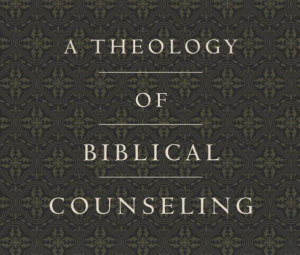 “Counseling is a theological discipline.” That statement captures the very heart of Lambert’s book. It is also, he says, the most “controversial part of this book” (11). Despite what many others believe, counseling is inherently theological and as such we must wrestle seriously with the theological foundations of our counseling ministries. In A Theology of Biblical Counseling Lambert attempts to outline the major doctrines of the Christian faith to demonstrate how they are indeed foundational for faithful counseling. The book is a comprehensive case for the sufficiency of Scripture in counseling all people.
“Counseling is a theological discipline.” That statement captures the very heart of Lambert’s book. It is also, he says, the most “controversial part of this book” (11). Despite what many others believe, counseling is inherently theological and as such we must wrestle seriously with the theological foundations of our counseling ministries. In A Theology of Biblical Counseling Lambert attempts to outline the major doctrines of the Christian faith to demonstrate how they are indeed foundational for faithful counseling. The book is a comprehensive case for the sufficiency of Scripture in counseling all people.
It should be stated that while this is not a systematic theology in the traditional sense it does parallel good systematic works. Lambert has demonstrated his own theological acumen and erudition in this volume as he tackles ten major doctrines of the faith in more than a cursory fashion. He does not, naturally, go into all the detail of a major systematician, nor does he directly interact with the dominant theological voices on these subjects, but readers will not find in these chapters an amateur gloss on doctrinal issues. There is a real theological development in each chapter. The key difference, however, between Lambert’s work on other systematic works is the application he gives specifically to counseling contexts. Each chapter begins with a case study and the doctrinal topic is then beautifully woven into the details of that case across the length of the chapter. The book is applied theology, but in a very unique fashion.
The large intent of the book is to demonstrate clearly the relationship between counseling and theology. While most counselors find such a correlation highly questionable, if not outright absurd, Lambert makes his case piece by piece. The first three chapters of the book are the most powerful arguments in the whole work. Chapter one establishes the theological nature of counseling by defining counseling and then demonstrating how all understandings of problems, people, and solutions are inherently theological – even if they are bad theology. We cannot escape the theological nature of reality, not even in secular counseling. So, Christians must wrestle with how Biblical theology will inform the way they help others. The second chapter asserts the sufficiency of Scripture. Here Lambert interacts with a number of critics to articulate a powerful defense of this doctrine, weaving it into a counseling case to help illustrate the point. Chapter three, then, addresses the issue of common grace. Here, again, Lambert is wrestling with his critics to frame common grace within a healthy relationship to the sufficient Word of God. Biblical counselors, he says, believe that good and helpful things can be found outside the Bible, but such valuable insights do not replace the sufficiency of Scripture. Furthermore, many other counselors fail to consider the noetic effects of sin and therefore overestimate the value and contributions of secular psychologies. Lambert writes:
The point of all of this is that secular therapies give us three things: observations and interventions that reflect reality as God created it and revealed it in the Bible, observations and interventions that fail to reflect the reality God created and revealed, and a system of worldview commitments that misunderstands even those realities that they have correct. These therapies do not add anything essential to a robustly relevant and biblical counseling system. We simply do not need the secular therapies in order to have a meaningful counseling approach. (100)
In other words, despite their many helpful insights, secular psychology cannot match the relevance and quality of insight found in the Scriptures. His demonstration, argument-by-argument, of the sufficiency of Scripture for Biblical Counseling is invaluable to the contemporary movement. The book is worth the price just for these three chapters in my opinion.
But the value doesn’t stop there. The work continues to expound the doctrines of God, Christ, the Spirit, Humanity, Sin, Suffering, Salvation, and the Church across its twelve chapters. With great finesse Lambert demonstrates how each doctrine is valuable to counselees as he seeks to help them with a wide array of problems. Interacting with relevant Scriptural passages, critics of Biblical counseling, and a handful of academic theologians Lambert gives us a thoroughly theological counseling paradigm. This is a much-needed work that certainly builds on Jay Adams, but also goes beyond him. While Adams and Lambert interact with many of the same doctrines, Lambert does a good job of contemporizing his work to answer the most pressing attacks by critics of Biblical Counseling, especially those from within Evangelicalism. His work answers a much-needed call to formally and strategically respond to opponents.
This is a great book. It is highly accessible and will serve as a great introduction to Biblical counseling for those who are just beginning to understand it. It will become, no doubt, a resource we use in our counseling training program here at CBC and a standard book I recommend. It will also serve as a good refresher for more seasoned counselors who need to be reminded of these foundational truths. I highly recommend A Theology of Biblical Counseling.

5 Comments